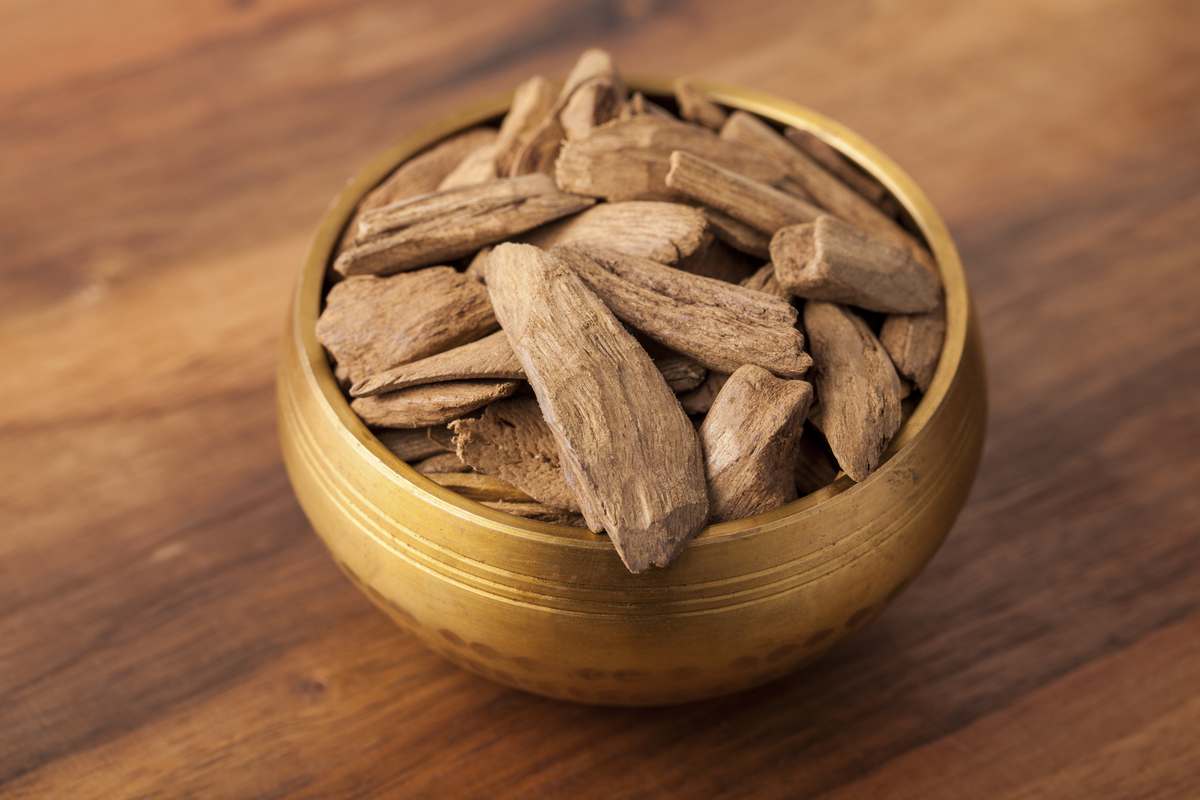Reading Time: 2 minutes
Agaru (Agarwood)

Amazing Facts about Agaru (Agarwood)
- Botanical Name and History:
- Botanical Name: Aquilaria malaccensis
- Agarwood, often referred to as “oud” in the Middle East, has been cherished for centuries for its captivating aroma and therapeutic properties.
- Common Name: Commonly known as Agarwood or Oud.
- Synonyms in Hindi, Sanskrit, Regional Languages:
- Hindi: Agar, Agarwood
- Sanskrit: Agaru, Aguru
- Regional: Akil, Akil-Karumbu (Tamil), Aguru (Telugu)
- Parts Used: The heartwood of the Aquilaria tree, particularly the resinous portions, is used.
- Source: Plant-based.
- Native Region & Geographical Distribution:
- Native to Southeast Asia, including India, Indonesia, and Malaysia.
- Grows in tropical and subtropical regions.
- Natural Season of Availability: Agarwood can be harvested year-round.
Chemical Composition
- Agarwood’s complex aromatic profile comes from its rich composition of volatile oils and resins.
- The main aromatic compounds include sesquiterpenes and phenyl-ethanol derivatives.
Nutritional Value
- Agarwood is primarily valued for its aromatic and therapeutic properties and is not consumed as a nutritional substance.
Benefits on Health
- Aromatic Therapy: Agarwood is renowned for its unique and soothing aroma used in aromatherapy to relieve stress, anxiety, and promote relaxation.
- Traditional Medicine: In traditional practices, it’s used to alleviate digestive disorders, respiratory issues, and to improve mental clarity.
- Spiritual Significance: Agarwood is often used in meditation and spiritual rituals for enhancing focus and deepening consciousness.
Frequently Asked Questions (FAQs)
Q1: Is Agarwood safe for direct consumption?
Ans: Agarwood is primarily used for aromatic and therapeutic purposes and is not typically consumed directly.
Q2: What forms is Agarwood available in?
Ans: Agarwood is available as essential oils, incense sticks, and resins for burning.
Q3: Can Agarwood be used during pregnancy?
Ans: Pregnant women are advised to use Agarwood under professional guidance due to its potent effects.
Q4: Does Agarwood have medicinal effects?
Ans: Agarwood’s traditional use suggests potential benefits for digestion, respiratory health, and mental well-being, but more research is needed.
Q5: Are there any allergic reactions associated with Agarwood?
Ans: Allergic reactions are rare, but some individuals may be sensitive to essential oils. A patch test is advisable.
Precautions when Using Agaru (Agarwood)
- Essential oils should be diluted before use to prevent skin irritation.
- Use Agarwood products from reputable sources to ensure authenticity.
Recommended Dose
A few drops of diluted Agarwood essential oil in aromatherapy or a small amount of Agarwood resin for burning.
How to Use Agaru (Agarwood)
- Aromatherapy: Diffuse Agarwood oil to enjoy its relaxing aroma.
- Incense: Burn Agarwood incense for meditation and relaxation.
- Traditional Applications: Consult with professionals in traditional medicine practices for usage.
Healthy Recipe Using Agaru (Agarwood)
Agarwood-infused Herbal Tea
Infuse herbal tea with a drop of diluted Agarwood essential oil for a soothing aromatic experience.
Side Effects of Agaru (Agarwood)
- Agarwood, when used in moderation and under professional guidance, typically does not cause side effects.
- Essential oils should be used with caution to avoid skin irritation or allergic reactions.
Conclusion
Agaru (Agarwood), a gift from nature’s aromatic treasure, holds not only captivating scents but also potential therapeutic benefits. However, due to its potent properties, it’s essential to exercise care and seek professional guidance before incorporating it into your wellness practices.
